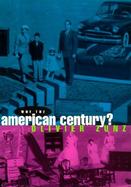In a bold reinterpretation of our country's rise to world power, Olivier Zunz shows how Americans appropriated the twentieth century; America's ascension was not the result of Europe's self-destruction. By the Second World War, Zunz argues, American policymakers, corporate managers, engineers, and social scientists were managing the country from within a powerful matrix of institutions devoted to fostering new knowledge. These men and women promoted a new social contract of abundance which was capable, in theory, of deradicalizing class, and their efforts helped create an American middle class defined by consumer behavior. In the name of democracy, they promoted a controversial ideology that stressed the value of respecting differences among people. The result was a culture that allowed Americans to intervene on the world scene with the justification that they were right in doing so.
Zunz explores the struggles of these American elites as they tried to maintain a democratic, modern mass society. While acknowledging the successes of their plans, he also reveals the limits of a system ultimately benefiting an abstract "average" consumer. Zunz goes on to show how their principles were tested on postwar Japan while Americans debated the respective merits of modernization and individualism.
An impressive work by a superior historian, this book restores our appreciation of the forces that produced a unique period in American history and, at the same time, exposes the internal contradictions that would ultimatelyundermine Americans' belief in their own ideology.
| Seller | Condition | Comments | Price |
|
Books From California
|
Very Good |
$3.95
|
|
Midtown Scholar Bookstore
|
Very Good |
$6.68
|
|
Priceless Books
|
Good
|
$10.12
|
|
Daedalus Books
|
Very Good
|
$12.77
|
|
ErgodeBooks
|
Good |
$14.05
|
|
Bonita
|
Good
|
$33.51
|
|
GridFreed
|
New |
$83.28
|
|
Bonita
|
New
|
$96.70
|


